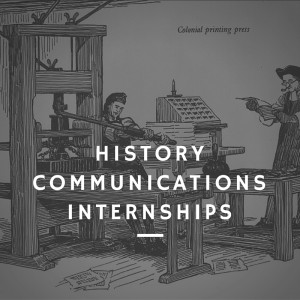 Of late, several professors have inquired whether I offer, or have considered offering, semester-long internships at Ben Franklin's World.
Their requests relate that I could teach their students valuable digital communications skills they could use in either history or non-history jobs.
Of late, several professors have inquired whether I offer, or have considered offering, semester-long internships at Ben Franklin's World.
Their requests relate that I could teach their students valuable digital communications skills they could use in either history or non-history jobs.
Teaching history communications is something I have thought about and something I may pursue in the future.
Teaching History Communications
My thoughts about how I would teach history communications come from thinking about how my involvement with Ben Franklin's World will change or end.
The podcast has been a successful history communications experiment. Within 15 months it has surpassed 500,000 downloads and become a top 8% podcast.
At the moment, I enjoy the intellectual, technical, and interpretive challenges the show offers. But it is not a project I see myself pursuing in its present form for my entire career.
I am a serial problem solver. I find a project or problem that interests me, study it, solve it, and move on to the next project or problem. At some point (I don't know when), I will move on from Ben Franklin's World to one of the other history communications project ideas I have or will have.
Knowing that I have a propensity to seek new challenges, I have started thinking about the long-term future of the podcast. I have three or four ideas about what the future might look like. With the exception of one scenario, all of the ideas involve ensuring that the podcast will continue to exist as a platform for early Americanists to communicate their work to the public.
***
One idea for Ben Franklin’s World would be to adapt the project for use as an in-classroom educational tool. This would allow me to keep tabs on the project and use it to train students in history communications. [1. I am aware of the many challenges associated with this scenario.]
I imagine a history communications course as a full-year commitment and one that is run more like a science lab than a traditional history course.
The first semester would be the equivalent of a how-to tutorial. We would discuss an interdisciplinary assortment of texts about history, writing, social media, marketing, broadcast journalism, and software and apply the ideas we discuss to podcast episodes in progress.
The second semester would be about the students taking what they have learned to develop their own history communications projects.
This course would offer a win-win situation. The students would benefit from having a working platform to learn on and a project for their job portfolio. I would be able to handoff and work on some of the numerous ideas I have for projects.
I also imagine that the profession would benefit from a course like this one as at least a few of the students’ projects would take off and ultimately provide historians with more communications infrastructure.
Internships at Ben Franklin's World
Although I have sketched the above course in my brain, there are three reasons why I can't adapt and offer it as an internship at present.
First, I don’t undertake any project unless I can do it right and I am not convinced that I can teach all of the skills the professors have asked for virtually and in one semester.
Trying to offer a virtual, semester-long internship would prove frustrating for me and the students.
Some of the software I use for social media and the podcast (which could also be used for websites, blogging, and videos) would be best taught in person so I can provide hands-on assistance.
Also, I can't see how I can offer both the context for how I do what I do and technical skills in one semester. There wouldn't be enough time and to teach one without the other doesn’t make sense to me.
Second, I already have students, thousands of them.
Ben Franklin's World has created a virtual, limitless classroom. Thankfully, not all of my listeners e-mail, tweet, or Facebook message me, but many do and their thirst for information keeps me busy.
Third, there are time and financial aspects of the professors’ requests that do not make sense for me.
Each correspondent has espoused the benefits of “free student labor.” Students would learn about my project while taking some of the work it requires off my plate.
Truthfully, even if I just taught technical skills, it would take me a semester to get a student to the point where they could reliably help me with the technical and time-consuming aspects of the project. For most of the semester they would slow me down. As a historian with many projects and students of my own, time is not a resource I have in abundance.
There is also the fact that professors get paid to teach valuable skills and knowledge to their students. I have valuable skills and knowledge these professors want me to teach their students. Why should they get paid to teach their students while I provide the same service for free?
***
I realize that all of the professors who e-mailed me value my work and skills. None of them intended to suggest that I teach their students for free. Their requests came from a place of interest in my work and a recognition that I could offer their students a history education with identifiable and marketable job skills.
However, the facts remain that I am not an institutionally supported professor and I do not presently have the resources to teach history communications effectively or add more teaching to my workload. Therefore, for the time being, I will not be offering any internships.